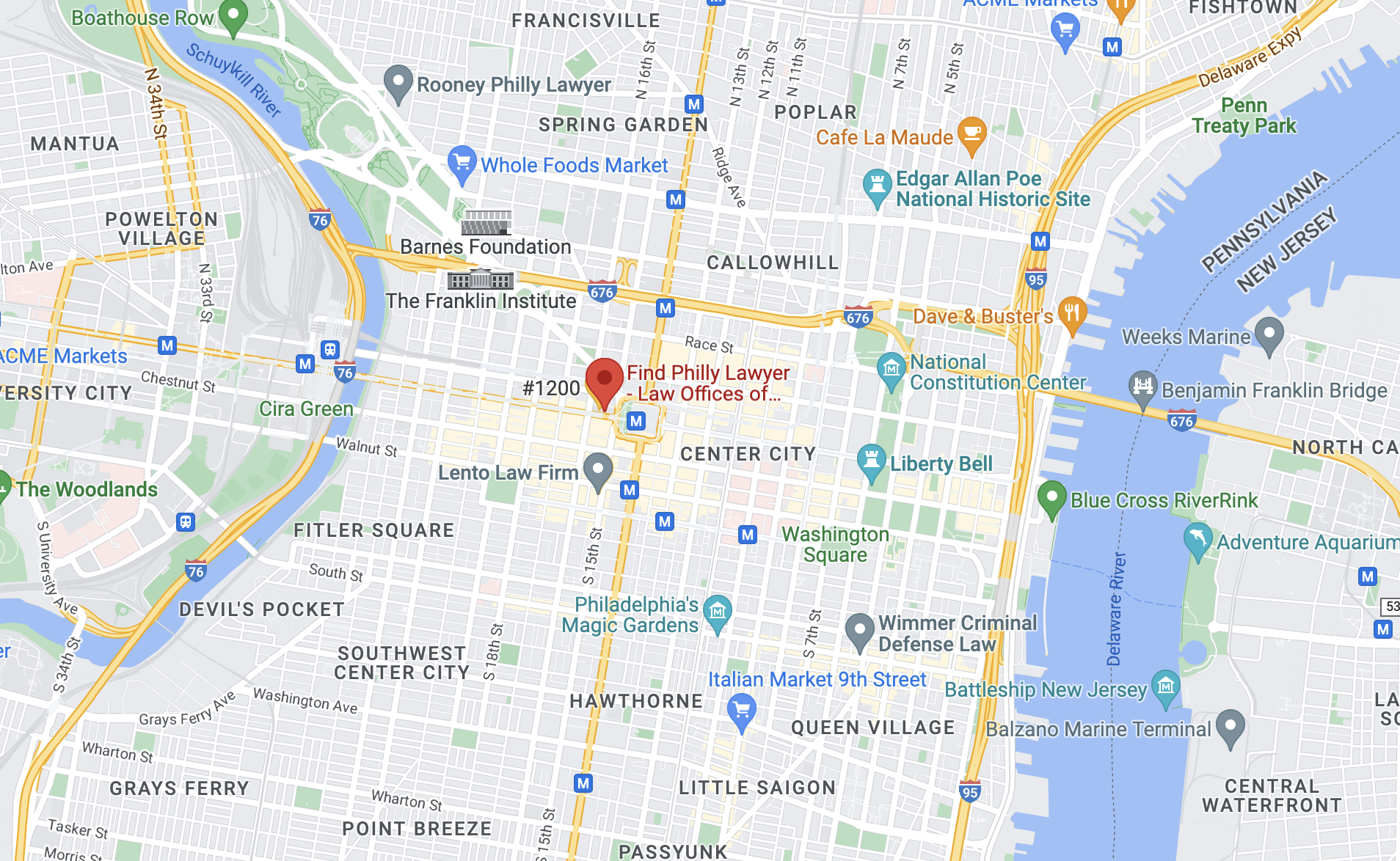Homicide charges are among the most serious offenses on the books. You might be overwhelmed by the potential consequences and feel there is no hope for your case, but an experienced lawyer can help protect your rights.
Homicide charges can range from severe murder charges to somewhat less severe charges for things like manslaughter. Remember, various other related charges often accompany homicide charges, and you should speak to a lawyer immediately. With so many ways a person might be charged with a homicide-related offense, it makes sense that penalties vary, too. While these charges can feel insurmountable, you are innocent until proven guilty. An experienced lawyer can help you protect your rights from overzealous police and prosecutors who want to sentence you before you even get a trial.
Speak to our Philadelphia homicide and murder defense lawyers by calling The Liberty Law Team at (215) 826-3314 and schedule a free review of your case and charges.
When to Call an Attorney About Fighting Homicide or Murder Charges in Philadelphia
Being caught up in the criminal justice process can feel overwhelming, and many people are not sure whether they need an attorney. You might have had numerous contacts with the police, but no formal charges have been filed. Perhaps you have already been arrested, and you will go in front of a judge soon.
Defendants are often frustrated at the lack of answers to their questions. People like prosecutors and the police usually know exactly what is going on, but they tend to avoid revealing any information to confused and frightened defendants. The answer to your questions is to call an attorney now.
If you were very recently arrested, reach out to our homicide and murder defense lawyers immediately for help. Even if no criminal charges were filed against you, call a lawyer. The fact that charges have yet to be filed does not mean they will never be filed. The police might still be building a case against you, and your attorney can help you protect yourself during the investigation.
Maybe you have not been arrested, but you believe an arrest is imminent. You might have a feeling or even confirmation that you are under criminal investigation by the police. Do not wait until after the police make their move to arrest you to call a lawyer.
To sum it up, you should call a lawyer about fighting your criminal charges as early as possible. You do not have to have been arrested or even charged to need a lawyer’s help. Having a lawyer on your side as early as possible is a great way to protect your rights and build a strong case in your defense.
Possible Homicide and Homicide-Related Charges in Philadelphia
Not every charge for criminal homicide is for some premeditated murder or cold-blooded killing. Many homicide charges are related to accidental deaths or deaths caused by the defendant’s allegedly reckless behavior. In some cases, the defendant’s connection to the alleged victim’s death is more remote. As such, homicide and murder charges can range from being extremely severe to more manageable.
Criminal Homicide
Criminal homicide is less of a criminal charge and more of an umbrella term encompassing various charges related to murder and homicide. Under the law, criminal homicide is defined as someone intentionally, knowingly, negligently, or recklessly causing another person’s death. This is a very broad definition.
To fall under this umbrella of criminal homicide, a crime must be charged as some form of murder or manslaughter. This includes murder in the first, second, or third degree and both voluntary and involuntary manslaughter.
The term criminal homicide is likely to come up when the authorities are figuring out what specific charges they want to pursue. If you hear the phrase criminal homicide being tossed around, speak to a lawyer immediately.
Murder
Murder charges are in the headlines all the time, and people often think of murder charges when discussing cases of criminal homicide. There are numerous types and degrees of murder charges, and you should talk about your specific charges with your attorney as soon as possible.
First-degree murder is the kind of charge you would likely hear about on the news. It involves an intentional and premeditated killing. Premeditation involves deciding or planning to commit the killing ahead of time. The amount of time necessary to establish premeditation may be surprisingly short. In some cases, only a few minutes is enough to establish premeditation.
Second-degree murder is sometimes referred to as felony murder. To be charged, the defendant must have committed a killing while in the process of committing some other felony. The defendant need not have intended the killing or shown any premeditation. Additionally, the defendant does not have to be the main perpetrator of the felony. Even an accomplice to the felony can be charged with second-degree murder.
Third-degree murder includes all other murder charges that do not fit within the other two categories. Even so, third-degree murder may be charged as a first-degree felony.
Manslaughter
Manslaughter charges are often less severe than those for murder. Manslaughter typically involves unintentional killings and a lack of premeditation. A defendant might be charged with voluntary or involuntary manslaughter.
Voluntary manslaughter is a first-degree felony and may happen under several different circumstances. You might be charged if you killed someone without any lawful justification and acted under an intense and sudden passion from some serious provocation. You might have heard crimes like this referred to as “heat of passion” killings. Alternatively, you can be charged if you killed someone under an unreasonable belief that you were somehow justified. While justification can be a defense, it must be reasonable.
Involuntary manslaughter happens when someone causes the death of another directly through their reckless or negligent participation in some unlawful act. It can also occur when a person commits a lawful act in a negligent or reckless way. Involuntary manslaughter may be charged as a first-degree misdemeanor. If the victim was younger than 12 and in the care of the defendant when the killing happened, the charges may be upgraded to second-degree felonies.
How a Lawyer Can Help You Fight Homicide Charges in Philadelphia
There might be numerous ways our Philadelphia homicide and murder defense attorneys can protect your rights, receive the charges, or even avoid a conviction. One method is to examine the evidence against you and attempt to prevent the introduction of unlawful or questionable evidence.
Challenge the Sufficiency of Evidence
To be admitted into court, evidence must meet rigorous standards. The cardinal rule of evidence is that it must be obtained through legal means. If the police seized evidence without a valid warrant or an exception to the warrant requirement, the evidence is tainted and should be excluded. This can be crucial in cases where key evidence, like an alleged murder weapon, is seized illegally. Without the key evidence, the prosecutor’s case might completely fall apart.
Even when evidence is obtained by lawful means, it might still be somehow insufficient and inadmissible in a court of law. For example, hearsay evidence is categorically barred unless it meets special exceptions. Hearsay evidence is often based on second-hand information and cannot be verified or substantiated. If prosecutors try to introduce hearsay evidence, our homicide and murder defense attorneys can object.
Other evidence is prohibited unless special rules apply. For example, prosecutors generally cannot introduce evidence about a defendant’s character or personality unless the defendant does so first. If the prosecutor wants to introduce evidence they believe shows you are characteristically violent or aggressive, they cannot do so unless we address your character first, which we do not have to do. If such evidence is introduced, we can try to strike it down.
Plea Bargains
Sometimes, it is better to work out a plea agreement with prosecutors than to fight the charges in court. In a typical plea agreement, prosecutors will reduce or remove some charges in exchange for a guilty plea. This might help you reduce a possible sentence.
Plea bargains are often negotiated, and there is some back-and-forth with prosecutors before a deal is reached. The number one rule of negotiations is never to accept the first offer. If you are being lowballed or duped by prosecutors, your lawyer can help you argue for a better deal.
Remember, plea bargains are not required nor guaranteed. Even if you would rather take a plea deal, the prosecutor might be unwilling to offer one. Alternatively, the prosecutor might offer a good deal, but you do not have to accept it. Sometimes, your odds of success in a trial are good, and it is better to reject the plea bargain. Knowing the difference between these situations can be hard, and that is where your attorney comes in.
Trial Strategies
If we do pursue a full trial, we can work to raise doubt where necessary. For you to be convicted, the prosecutor must prove their case beyond a reasonable doubt. This is an extremely high bar to meet. If evidence is questionable, weak, or inconclusive, we can raise doubts in the jurors’ minds and urge them to find you not guilty.
There may be several weak points in the prosecutor’s case against you that we can highlight in order to raise reasonable doubt. If we believe that any of the prosecutor’s witnesses are lying or have a reason to be dishonest, we should say so when we cross-examine them.
In many cases, evidence is not definitive. It is only one small piece of a larger puzzle. If the prosecutor’s case is largely comprised of circumstantial evidence, we can emphasize this point to the jury. Jurors understand the magnitude of their decision in a homicide case, and they are often unwilling to find a defendant guilty unless the evidence is nearly certain.
Law Enforcement and Warrants in Philadelphia Homicide Cases
As briefly mentioned above, challenging evidence seized under faulty warrants or in the absence of warrants is a common and often effective defense tactic. The law surrounding search and arrest warrants is notoriously complex, and you may need to rely on your lawyer for help in this area.
The absence of a warrant is a big red flag, but it does not mean for sure that the police acted unlawfully. Numerous exceptions to the warrant rule exist, and one might apply in your case. Your attorney can review the circumstances of your case to determine if one of these exceptions did or did not apply. If one does not, we should absolutely challenge the evidence based on the lack of a warrant.
Much evidence is seized under an arrest warrant rather than a search warrant. The police may seize evidence they find while executing an arrest to a certain extent. For example, if you are arrested, the police may conduct a pat-down as a safety precaution to ensure you have no dangerous weapons that might be used to hurt them. If they find any such weapons, they can take them and use them as evidence. If we can challenge the validity of the search warrant, the evidence seized under the warrant may be inadmissible and excluded.
The arrest warrant might be invalid if it is not based on sufficient probable cause. Probable cause can be difficult to define, but it is usually considered any information that reasonably leads law enforcement to believe a crime has been committed and the arrestee is the perpetrator. The police sometimes jump the gun and get a warrant before they have enough probable cause. If that is the case, the arrest and any evidence obtained pursuant to it should be invalidated and excluded from your trial.
Contact Our Philadelphia Homicide and Murder Defense Lawyers
Speak to our Philadelphia homicide and murder defense lawyers by calling The Liberty Law Team at (215) 826-3314 and schedule a free review of your case and charges.



 Liberty Law Team
Liberty Law Team  (215) 826-3314
(215) 826-3314 lonny@libertylawteam.com
lonny@libertylawteam.com





